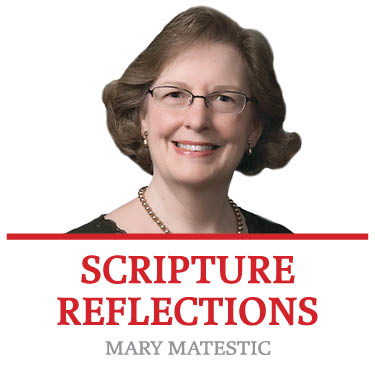Scripture Readings: Aug. 16, 2020
by Mary Matestic

20th Sunday of Ordinary Time
Isaiah 56:1, 6-7
Romans 11:13-15, 29-32
Matthew 15:21-28
In my final semester of college, the faculty brought in Dr. Sterling Stuckey, a young professor from Northwestern University in Chicago, to teach. The pulse of the Civil Rights movement was swelling and this Black teacher, who later wrote a book called “Slave Culture, The Journal of African American History,” taught an auditorium of white women the sordid details of slave history.
As the drama of the class unfolded, pulling from the closets ghosts none of us wanted to face, I was absorbed. Dr. Stuckey did not hold back but succeeded in marching all of us into a world of human abuse. I looked upon the history more personally than objectively. At first I thought, “How could they do such things to any human being?” Then, I became aware that people of Western Europe were the “they’s” I was blaming. Somewhere during that semester, I awakened to the reality that I was white, and much of the wealth of this nation was built upon the backs of slaves. My ancestors, and by extension, I, benefited. I became aware that sin has a universal, cosmic component, which pushed back on mercy. America’s dark history created a still existent, toxic racism. And eventually, the “they” became “we” then turned to “I.”
Though I finished reading the chapters at night weeping, there arose in me a deep awareness of human suffering. Perhaps it was the birth of compassion which became my sacred guide. The class changed me.
In this weekend’s Gospel, we meet a foreign woman, a Gentile woman who is a Canaanite. She is in complete solidarity with her daughter, who is tormented by a demon. What makes this woman wonderful is that she is loud, she is feisty and she, even though she is a Gentile, knows about Jesus who has traveled into the Gentile territory of Tyre and Sidon. She knows he is Lord, she knows he is from the Davidic line, and she has heard of his compassion and healing. The arc of Jesus’ mission was bent toward his own people, the people of the Covenant. Expanding his mission to the Gentiles was not on Jesus’ radar and so it was easy to ignore the outcries of this mother. And easier yet for the disciples to dismiss her.
She cries out “Have pity on me, Lord, Son of David.”
Though Jesus said nothing to the woman initially, he excused himself to his followers by indicating that he was not sent to call the Gentiles, but only the lost sheep of the House of Israel. But the woman bent down to do homage and again called Jesus, “Lord.”
This time Jesus responds to her. The metaphor of throwing table scraps to the dogs is harsh. “Dog” was a pejorative name showing contempt for the Gentiles. One might ask, where was the mercy for this woman and was the blind spot in Jesus eye so dark that he could not feel compassion in this case as he had in so many other situations past?
There is something in this woman that is going to break open within Jesus a kernel of mercy that is holding out against the Gentile population. Jesus, the Messiah, was to gather in the tribes of Israel. But this woman challenged Jesus so that ultimately the human and the divine emerged from him. “Even the dogs eat the scraps from the master’s table,” she cries out. This was the moment of insight. This was the moment where the woman was no longer just flesh and blood, but within her Jesus heard the call of the Father. For Jesus only did what he saw the Father doing … and the hand of his Father now would reach out to all peoples, all nations.
“O, woman, great is your faith!” I cannot imagine Jesus looking at that woman without tears in his eyes. I am certain Jesus wondered about the rest of the nations during his mission and on this day, through the outcries of a mother in terrible distress, Jesus perhaps realized for the first time that all peoples are precious to God. All nations cry out for salvation.
Though we can learn something about the persistence of prayer from this woman, more importantly is that Jesus continued to learn about his Father’s greater vision. Jesus, too, did not have all the answers immediately. Like us, he grew into them. Perhaps he went back to the prophet Isaiah, who declared that even the foreigners who join themselves to the Lord, loving the name of the Lord and becoming his servants, that even they will be cradled in the arms of God as His own.
There are people who come into our lives that significantly change our worldviews, casting us into darkness so that ultimately the light might shine through. Sometimes they are teachers and sometimes they are the heartfelt cries of women and men who advocate out of hearts of deep love.
